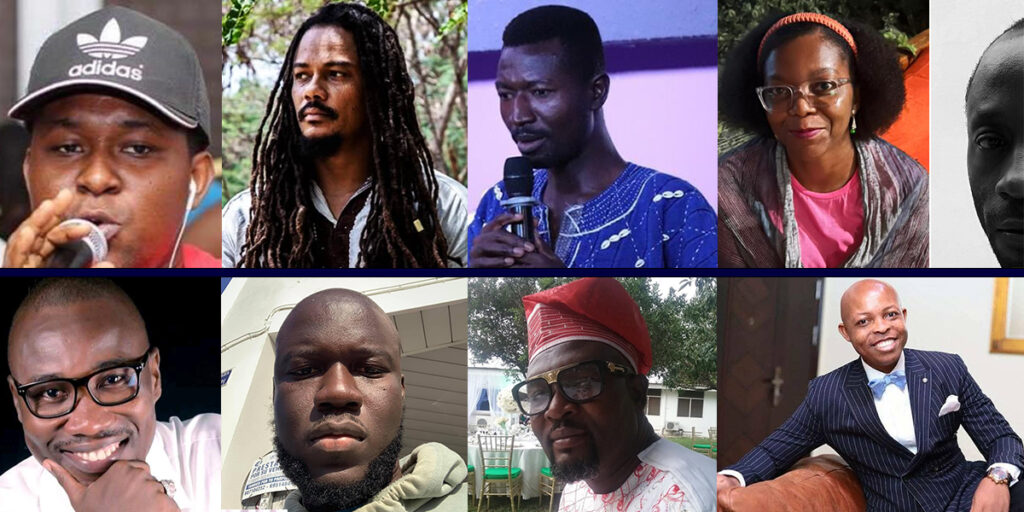[et_pb_section fb_built=”1″ admin_label=”section” _builder_version=”4.7.6″ hover_enabled=”0″ background_color=”#000000″ sticky_enabled=”0″][et_pb_row admin_label=”row” _builder_version=”3.25″ background_size=”initial” background_position=”top_left” background_repeat=”repeat”][et_pb_column type=”4_4″ _builder_version=”3.25″ custom_padding=”|||” custom_padding__hover=”|||”][et_pb_text admin_label=”Text” _builder_version=”3.27.4″ background_size=”initial” background_position=”top_left” background_repeat=”repeat”]
COMMUNIQUÉ
Urgency to Slam in Ghana
Dear Poets, Ladies and Gentlemen of our beloved Poetry Community,
As a community, we all need to help in seeing what we hold dear grow up. We need to do things that support, not only our individual growth but also, the collective growth. One sure way is collaboration and slam poetry performance, and my interest here is about “Slam” in Ghana. Slam poetry has been with us for years, and since its birth in the 80s by Marc Kelly Smith, a local poet and construction worker in Chicago, it has given birth to some of the great voices of our time globally. This is also evident in Ghana, but not many people are aware.
My proposition is to present to all of you who already know, and all who are yet to know, what slam is and why we need poets like you and I to take up the mantle to challenge ourselves for what is coming. This is also a time to open the floodgates of creativity – to walk out of comfort zones – into something that is needful for the entire community of poetry and spoken word.
Slam poetry is the ‘ish’ now, and though it is competitive, it is also a healthy challenge (real life issues to deal with) among equals and gives poets opportunities to travel as well. I am proud to say that our slam journey did not start yesterday. It began way back in 2009 at Alliance Française d’Accra. We have seen what it has become and what it is still becoming. Below are some of our own first-generation slammers who were participants of the first slam we organized here in Accra following my own slam experience in Harare, Zimbabwe.

Mutombo da Poet, Juno Mamacita, Crystal Tettey, Jahwi, Joss, Fapempong, Rhyme Sonny, D.K. Osei-Yaw, Andy Aryeetey, Nana Asaase, Nii Lantey, Etc.
My submission is to let us know that these early slammers – good poets in their own right – did not have any fear whatsoever about who won or who lost. The motivation was to ignite a drive into the poetry scene; a key element to the development of the landscape, and to also see what new works could be generated from subsequent slams (bearing in mind that one cannot perform the same piece twice or bring back a poem that has already been on the slam stage). Slam encourages you to do more and to create new works every time. Who benefits from slam but the slammer?
If you can hear my words, let it resonate in you, give yourself a chance and challenge the poet in you. You will be proud that you took a stance for something that will help uplift the face of poetry in Ghana.
May I be honest here to speak about your selfishness and mine. Feeling we have arrived as poets in our fragile zones of comfort will not help anyone. It will not help the community. We need to open up the space to innovations and new forms of doing this thing called art regarding performances. We need you rise beyond me, my mouth and mic mimics and walk into some new grounds, for we have come of age. Poetry in Ghana is viewed highly by other Africans more than you can imagine; even more reason for us to wake up and live up to some of these expectations for us.
Currently, there are some slam poets across Africa who are willing to come to Ghana to attempt slamming with our slam poets just to sharpen themselves and to meet and see all the good they hear about Ghana. Yet, we have a community of poets who have refused to rise to the call of the times. This is the time for Slam Poetry, and it is not surprising that the 2nd edition of Africa Cup of Slam Poetry just ended last November in Addis Ababa, Ethiopia, with Guinea emerging as the Africa champion. And, the 1st edition of the World Poetry Slam Championship will hit the city of Brussels, the capital of Belgium, in September 2022.
I propose that, over the next three years, we challenge ourselves to mentor slam poets and a willing community for the next generation. We need all hands on deck to meet this urgent call. I know that not everyone is willing or has the guts to slam, but we all can do something to see the development of this movement become what it supposed to be.
Ghana is strategically well-positioned to possibly host the Africa Slam Championship here in Accra, but we have to work to see venues hosting slams and poetry events regularly.
We need to:
• initiate conversations and discussions around slam and poetry,
• organize workshops and training programs to facilitate our readiness for what we are expecting,
• increase visibility in schools and communities, and introduce the movement to them,
• use the medium to tell our own stories, advocate and to show young people that there is power in their voice.
Slam Poetry is the last art cry to hit our nation’s capital. Slam is the new face of poetry in Ghana. And slam is going to be the undeniable platform for exposure and cross-cultural experiences.
Let the conversation begin …
Yibor Kojo Yibor
Dakar, May 2022
[/et_pb_text][/et_pb_column][/et_pb_row][/et_pb_section]


